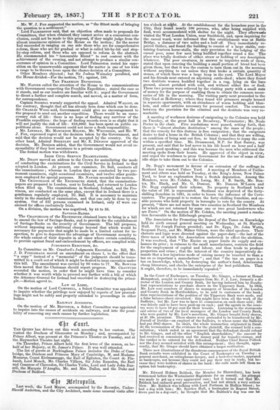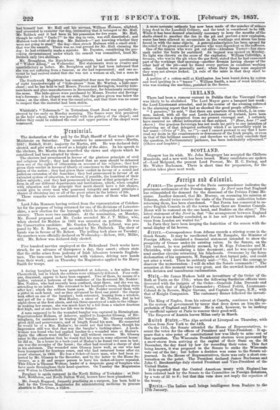It4t Ytittrufulis.
Last week, the Lord Mayor, accompanied by the Recorder, UnderSheriff Anderton, and the City Architect, Mole some unusual visits after ten o'clock at night. At the establishment for the houseless poor in the City, they found nearly 100 persons, who, after being supplied with food, were accommodated with shelter for the night. They afterwards visited the West London Union, near Smithfield, and, upon inquiring for the casual ward, were informed that this establishment was at Battle Bridge, a distance of two miles and a half off. They immediately repaired thither, and found the building to consist of a large stable, containing fourteen horse-stalls, the only provision for the lodging of the casual poor, some few men being huddled together round a fire. The place was totally destitute of either straw or bedding of any description whatever. The poor creatures, in answer to inquiries made of them, stated that upon entering the building a small portion of bread had been given them, but that it was the custom to turn them out in the morning without anything to eat unless they first broke a certain quantity of stones, of which there was a large heap in the yard. The Lord Mayor and his friends next entered an adjoining cattle-shed ; where they found two destitute women huddled together in a rug, lying on the bare ground, almost perished with cold, and without either fire or food. These two persons were relieved by the visiting party with a small sum of money for the purpose of enabling them to obtain the common necessaries of life in the morning. The visiting party next proceeded to the City Gaol at Holloway; where they found 455 prisoners snugly housed in separate apartments, with an abundance of warm bedding and blankets, and other articles necessary for personal comfort. The contrast between the provision for the criminal and the destitute was very remarkable.
A meeting of workmen desirous of emigrating to the Colonies was held on Tuesday, at the great hall in Broadway, Westminster ; Mr. Neale Porter in the chair. Five resolutions were passed, setting forth, that there is "almost absolute destitution" among the mass of the people ; that the remedy, for this distress is free emigration ; that the emigrants desire to find a home in the British Colonies ; and that they are willing, on condition of being sent out free, to bind themselves to repay the cost within a specified time. Mr. Drummond, M.P. for East Surrey, was present, and said that he had never in his life heard an hour and a half of such good speaking ; and this was because the men who addressed the meeting spoke from their hearts. He approved of the object in view, and urged the workmen to press Government for the use of some of the idle ships to take them out to the Colonies.
Dr. Begg's movement in favour of an extension of the auffrage in Scotland has reached Palace Yard. A meeting of Members of Parliament and others was held on Tuesday, at the King's Arms, New Palace Yard, to hear an explanation from a Scotch deputation. Among the Members, were Mr. Cobden, Mr. Laing, Mr. J. B. Smith, Mr. Baxter, Mr. Black, and Mr. G. Duncan. Mr. Duncan EPLaron and Dr. Begg explained their scheme. No property in Scotland below the value of 101. is represented. Scotland was deprived of the fortyshilling franchise in 1681, in order to lessen the influence of the Covenanters. The proposal is to restore the forty. shilling franchise, and enable persons who hold property in boroughs to vote for the county. At present, "there are not more than two counties in Scotland the Members for which are not returned by some one or two great landowners who are Peers." On the motion of Mr. Cobden, the meeting passed a resolution favourable to the Edinburgh proposal.
The Association for Promoting the Repeal of the Taxes on Knowledge held its sixth annual general meeting on Wednesday, at St. Martin's Hall. Sir Joseph Paxton presided ; and Dr. Epps, Dr. John Watts, Sergeant Parry, and Mr. Milner Gibson, were the chief speakers. Their rhetoric and logic were directed against the paper-duty—the last of the three taxes of which the Association undertook to effect the abolition. It was resolved, that "The Excise on paper limits its supply and enhances its price ; is ruinous to the small manufacturer, restricts the field for the employment of capital and labour, and thus tends to produce pauperism and crime ; that the interest of the country imperatively demands that a less injurious mode of raising money be resorted to than a tax on so important a manufacture" ; and that "the tax on paper is a tax on knowledge, which, by destroyinF the author's fund, deteriorates cheap literature, and checks the enterprise of the best publishers. That it ought, therefore, to be immediately repealed."
In the Court of Exchequer, on Tuesday, Mr. Ginger, a farmer at Hemel Hempstead, sought to recover damages from Mr. I'. J. Law, formerly a director of the London and County Bank, for having induced him by fraudulent representations to purchase shares in the Tipperary, Bank. In 1856, Mr. Law sent numbers of shares to managers of branches of the London and County Bank in Hertfordshire, to be sold to customers of the bank
false false
representations of the position of the Tipperary Bank were made, and a false balance-sheet circulated: this might have been all the work of the Sadleirs ; but Mr. Law was to have 1/. commission on each share sold ; 10/. was falsely said to have been paid-up on each; and the agents in the country were to have 10 per cent for their trouble. Listening to the statements and advice of two of the local managers of the London and County Bank, who were guided by Mr. Law's assertions, Mr. Ginger bought forty shares, at 2/. 10s. premium. These shares were pretended to be transferred by Mr. Ferrell of Dublin—an employe of the Sadleirs, to whose name the Sadleirs had put 5945 shares. In short, the whole transaction originated in fraud. At the termination of the evidence for the plaintiff, the counsel held a consultation; which ended in an agreement that the defendant should refund to Mr. Ginger, and all the other "English shareholders," the amount be had received as commission and the money paid for transfer-stamps, and the verdict to be entered for the defendant. Neither Chief Baron Pollock nor the Jury seemed satisfied with this arrangement ; they thought, apparently, that Mr. Ginger should have obtained a larger restitution. Three new illustrations of the disastrous consequences of the Royal British Bank swindle were exhibited in the Court of Bankruptcy on lueeday : general merchant, an eatinghouse-keeper, and a boot-tree-maker, appeared as bankrupts, not because they could not pay their way in trade, but because they were holders of shares in the bank : the calls made left them no option but bankruptcy.
Mr. Edward Holmes Baldoek, the Member for Shrewsbury, has been summoned before the Westminster Magistrate for an assault. An atteinpt was made to get up a very aggravated case ; but it turned out that yr. Baldock had endured great provocation, and had not struck a very serious blow. Mr. Baldock was talking with Lord Portman in Halkin Street ; he had a dog with him ; Mr. Sparkes Hall, a bootrnaker in Regent Street, drove past in a dog-cart; he thought that Mr. Baldock's dog was one he had himself lost. Mr. Hall and his servant, William Ifulman, alighted, and proceeded to examine the dog, intimating that it belonged to Mr. Hall. Mr. Baldock said it had been in his possession for five years. Mr. Hall, though he called "Carlo !" to the dog in vain, was still dissatisfied; and Hulman took hold of the dog. Mr. Baldock—" not knowing whether they were not going to steal" the dog—then struck Huhn= with a small stick : that was the assault. There was no real ground for Mr. Hall claiming the dog : he had evidently made a mistake. Mr. Paynter, considering the provoking circumstances under which the assault was committed, fined Mx. Baldeck only two shillings.
Mr. Broughton, the Marylebone. Magistrate, had another questioning of " Widow Allsop," on Wednesday. Her statements were as evasive and unsatisfactory as before. Mr. Broughton said he' had been informed that she was not suffering from a tumour, as she had represented; and one account he had recived stated that she was not a woman at all, but a man in disguise !
The Southwark Magistrate has committed four men for stealing upwards of eight hundredweight of " hide-pieces " from Mr. Waring, a hide-merchant; and he has held to bail Messrs. Proctor and Bevington, wealthy hidemerchants and glue-manufacturers in Bermondsey, for feloniously receiving the same. The hide-pieces were purchased by Messrs. Proctor and Bevington's foreman : it is alleged on one side, that the price given was below the value; on the other, that it was the usual price, and that there was no cause to suspect that the material had been stolen.
Whitfield's " Tabernacle " in Tottenham Court Road was partially destroyed by tire early on Monday morning. The flames were first perceived in the boys' school, which was parallel with the gallery of the chapel ; and before they could be subdued the roof and upper portion of the chapel were consumed.



































 Previous page
Previous page